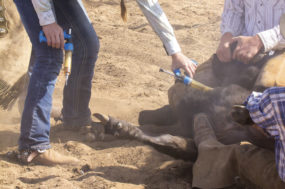Trade disputes, volatile markets, the worst weather in an old-timer’s lifetime, and now a global pandemic with its own brand of disruption and uncertainty have combined to pack a generation’s worth of difficulties into a few short years.
As we work through this global pandemic and its long tail of consequences, keep this in mind – we have a unique opportunity to build character and resilience into the next generation of the business, which they can pass along to many generations to come.
Teach them to focus on what can be controlled
Each crisis is distinctive in its effect on a business, but there are consistencies in how they need to be addressed. First, we need to identify what we can control. Identifying what we can control helps us stay focused, gives our people a sense of direction and allows us to maximize our efforts in those areas.
Next, get your bearings. This means we need to know where we stand in a variety of areas. What resources do we have available? What do we need that we don’t have? What do our people and their families need? What are our highest priorities? We must know the answers to these questions to guide our actions in the immediate stages of a crisis.
Teach them how to plan during uncertainty
Crisis management should be focused on the next 90 days. Develop a strategic plan for that timeframe with the information you have available. As each day or week provides more clarity, continue to update your plan for the next 90 days. Your vision is intact, so no need to revisit that element of your long-term strategy. Think of this as taking a bit of a detour along that path, or simply a pause in your progress.
Your attitude and mindset as a leader during a crisis are key to your success. There should be an Apollo 13 attitude of, “Houston, we have a problem,” with a goal of, “Whatever it takes, we’re going to get our guys home.” You need that level of focus and determination.
Develop key goals for your highest priorities. State them clearly and specifically. Keep in mind the sniper’s motto: “Aim small, miss small.” This involves addressing some key questions. What is the most important part of our business? How do we protect it? What are the biggest threats to it that we can control or mitigate?
Facts are your friends in a crisis. Don’t guess unless you absolutely must, and remember which decisions were based on those guesses so you can update them with facts as they become available. Use the best source you can find for information. Turn off the talking heads and attention-seekers and get as close as possible to those with first-hand data.
Every plan needs a contingency, or a backup plan, for if the situation changes significantly or the original plan fails. People think their plan of attack is great until they get punched in the face. Expect to get punched in the face a few times and let the next generation experience that with you – as well as the implementation of your contingency plan.
Teach them how to gain alignment with the plan
You can’t do it alone. Everyone needs to be fully engaged and aligned with your strategy or you risk missing your targets. You already know who you can count on. Involve them in your decision-making process and don’t assume you have all the answers. With all the unknowns and uncertainty, no one can be expected to carry the full load of trying to get every decision exactly right.
Remember, you’re going to be making lots of decisions as new information comes in, and you may have to change direction in a heartbeat. Give the next generation this experience so they are prepared for a similar situation on their watch. Don’t rob them of this opportunity. Your success in a crisis is based more on your ability to adapt to the developing conditions, rather than having a perfect plan.
Know the strengths of your people and count on them to fully utilize those talents. Be honest and transparent. Even though you’ve always been the main problem-solver and go-to person for answers, let them know when you don’t have all the information you would prefer. It actually helps build trust and confidence with your people by admitting what you don’t know.
Keep your expectations high. Remember that people are capable of doing incredible things when their backs are against the wall.
Teach them how to execute the plan with clarity and passion
Our family members need to know what changes will need to be made, how their regular activities will be affected, and if their basic needs will be met. We need to reassure them in these areas. If sacrifices will be needed, talk about them early in the crisis, not as a last resort.
It is always true that the things leaders say carry tremendous weight. This is even more valid in a crisis. You are the main person they look to for answers, and they also look to you for emotional guidance. Keep a level head during a crisis and model emotionally mature behaviors in your responses, instructions and leadership. Be an encourager and their biggest cheerleader. Remind them of their personal contributions to these efforts and build their self-confidence along with their competence.
Maintaining everyone’s behavioral health is essential. Take advantage of opportunities to step back from the intense demands of the crisis and simply relax, enjoy camaraderie, eat a good meal, slow things down and embrace the challenge as an opportunity rather than a burden.
Companies, families and organizations that persist through a crisis are much stronger, healthier and wiser as a result. Remember the lessons learned and make them a part of your family’s enduring legacy. ![]()
ILLUSTRATION: Illustration by Phillip Warren.
For more information about this topic or as a trainer/speaker, Don Tyler can be reached through his website at Tyler and Associates or at (765) 490-0353.

-
Don Tyler
- Founder
- Tyler & Associates Executive and Management Coaching
- Email Don Tyler









